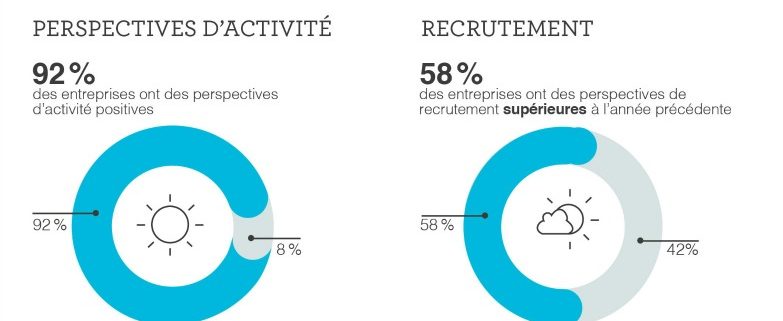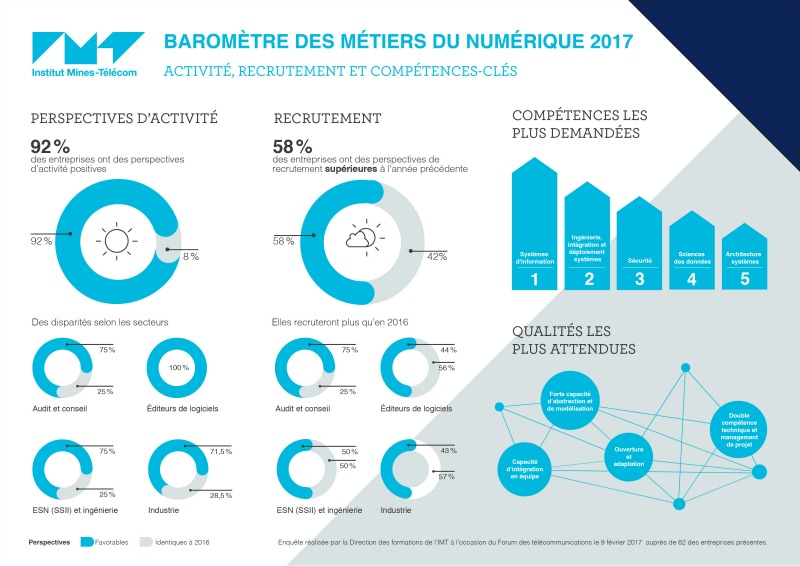Digital transformation : Employment trends
Big Data, the Internet of Things, cybersecurity etc. are skills that are increasingly sought after. Even though they don’t offer as many job vacancies as traditional occupations in the digital sector such as those for information systems, they are clearly riding high. Here are the major trends revealed by the 9th IMT Barometer, created for the Forum des télécommunications which took place on 9 February in Paris.
In the digital and telecoms professions, the crisis is well and truly over. After a very positive 2016, recruitment should stay at a high level in 2017. And young engineers are those who will benefit the most. This is what the IMT digital professions barometer shows, but in which fields ?
Infographic of the results of the 9th IMT barometer of digital professions (in French)
Datascientist, a new strategic profession
The digital transformation is creating new requirements, starting with the analysis of big data. According to the IMT barometer, Big Data in auditing/consultancy represents 13% of requests from companies. But this isn’t the only sector on the lookout for data analysts. The bancassurance groups are very keen, as are major manufacturers with their huge digitization projects. Selected as the “sexiest profession of the 21st century” by the Harvard Business Review, the datascientist is becoming strategic.
Since big data is difficult to interpret within corporate groups, calculations by this specialist concern operational matters as much as strategy.
PSA has made it one of their priority HR projects. With Criteo, Safran and BNP Paribas, the manufacturer is a partner of the Machine Learning for Big Data chair of Télécom Paris. A great way to train future talents within this field.
Digitization of industry and new skills
The digitization of industry is also creating a need for new skills. At Renault Nissan, in one way or another almost all of the engineering positions involve digital skills. Approximately 20% of employees work on a self-driving, connected vehicle. The manufacturer employs engineers who could also work at Google or Airbus. Digitization concerns not only the product design but also the entire industrial process. Welcome to the factory of the future where, for example, remote management positions are created for experts in industrial processes. In the control room, they implement actions recommended by the algorithms and modify them thanks to their on-the-ground knowledge.
Cybersecurity is a key issue for businesses and employment
Cybersecurity is becoming a major issue and few businesses can escape it. On the flipside of digitalization, new online threats are hitting companies’ websites and information systems, such as cyber spying or server attacks. So you can understand why security specialists are being snatched up in the job market. The shortage of profiles is genuine. It is difficult to find qualified candidates even if businesses offer higher salaries than in the majority of other IT fields. It is an up-and-coming profession within all sectors. According to the IMT digital professions barometer, it represents 13% of telecom operators’ requirements and 11% in auditing/consultancy and industry.
Web technologies and IoT
Web technologies are also future professions. This specialty represents 14% of software vendors’ requirements. Referencing experts, developers (J2E, SQL, JavaScript etc.), UX designers and more are among the in-demand specialties where the lack of candidates is likely to persist. Full-stack developers, those coding “Swiss knives” who know how to build an application from start to finish, are still very much sought after.
In addition, specialists of the Internet of Things are increasingly needed, especially in auditing/consultancy, services and at certain operators such as Orange. Connected objects bring many skills into play that range from electronics to programming via integration and energy optimization. Hardware and software are combined to form complex systems. In this sector, polyvalence is therefore perceived as a real asset.
Find the 2017 survey on the website of the « Observatoire des métiers de l’IMT »


















